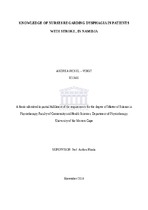| dc.description.abstract | Dysphagia is commonly known as a swallowing disorder associated with stroke patients. Between 37% - 78% of stroke patients suffer from it initially. Complications of dysphagia include aspiration leading to chest infection and pneumonia, malnutrition, dehydration, and an increased risk of death. Its early diagnosis and management is an important prerequisite for recovery from stroke during the rehabilitation phase. As healthcare professionals, nurses play an important role in the diagnosis and management of dysphagia in stroke patients. Studies have shown that nurses display a lack of knowledge about dysphagia in stroke patients. The aim of the study was to determine the knowledge of nurses regarding dysphagia in patients with stroke, at an Intermediate Hospital, in Namibia. The objectives of the study were to determine the knowledge of nurses regarding dysphagia, the association between the knowledge and socio demographic factors and to design an intervention program based on the knowledge of the nurses. The study was carried out in a selected hospital in Namibia. All nurses, who were employed at the Intermediate Hospital at the time of the study, were invited to participate. Of the 500 employed nurses, 188 accepted the invitation to participate in the study. The study used a quantitative method consisting of a survey to determine the knowledge of the nurses. Data was collected using a self-administered questionnaire with closed-ended questions which was developed by the researcher. The quantitative data were captured and analysed using SPSS (22.0 version). Descriptive statistics was used to summarize the study findings by using means, standard deviations, frequencies and percentages. To determine the association between the knowledge of dysphagia and the socio-demographic factors, therefore inferential statistics were used to in three levels of analysis. The findings of the study shows that nurses have a moderate knowledge regarding to the signs and symptoms and complications of dysphagia. Poor knowledge was identified in management of dysphagia. Further, the results also indicated that further training and experience in caring for stroke patients was more relevant to knowledge than the position and qualification of a nurse. Training and experience in the care of dysphagia patients is a stronger predictor of knowledge than the initial qualification or years of experience of a nurse. An intervention program was designed based on the information obtained from the findings of the questionnaire and supporting literature. Permission to conduct this study was obtained from the Senate Research Grants and Study Leave Committee at the University of the Western Cape. Written permission was obtained from the Ministry of Health and Social Services, Office of the Permanent Secretary, as well from the Acting Medical Superintendent of the Intermediate Hospital Oshakati. The aim of the study, confidentiality and the participants' freedom to withdraw from the study was explained. In order to maintain anonymity, nurses were asked to place informed consent forms and questionnaires in separate boxes. The outcomes of the study could be used to offer appropriate training programs to increase nurses’ knowledge of dysphagia in stroke patients. | en_US |

